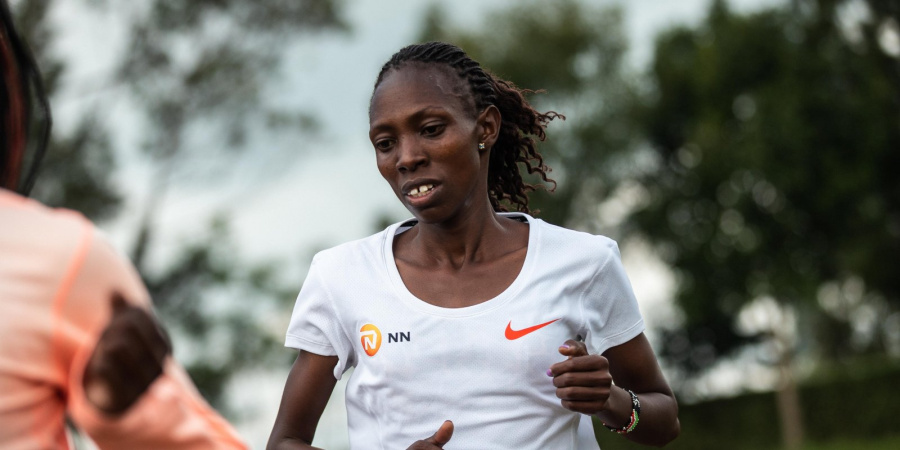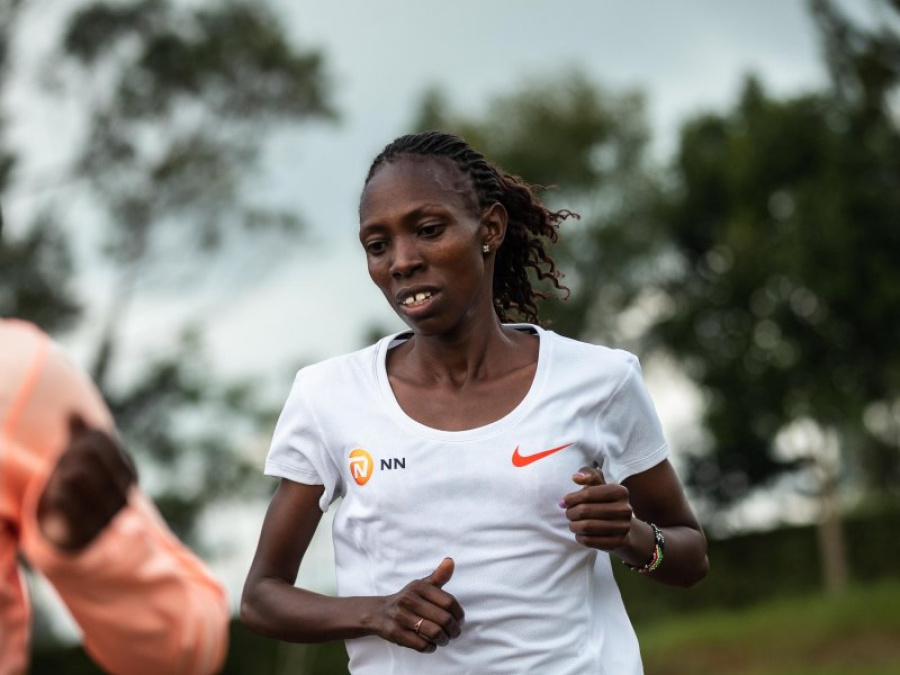

This Is: Selly Chepyego
"Don't be caught" a 15-year-old Selly Chepyego thinks to herself as she glides round the fields of her school, holding off the boys behind and closing in on the girls who've got a head start in their handicap race.
"I came to realise that I can run."
Chepyego modestly recalls, but the truth is something more impressive.
In 2001 Chepyego was precocious, a phenomenon who won her national trials and headed to the World Youth Championships.
Two years younger than many of her competitors she lined up in Debrecen, Hungary for the U18 3000m.
“My mind was still a young mind and the expectation was only that I want to win. I remember that I didn't even want to be disturbed by the spikes that I was not used to.”
Chepyego chose to run barefoot. As the gun sounded, off they went, a lead pack of three quickly developing, the youngster dictating the early pace.
17-year-old Mestawat Tufa, who seven years later took World Cross-Country silver in Edinburgh, stalked her early moves, with fellow Kenyan Fridah Domongole trying her best to cling on.
As the later stages arrived, three became two, little seeming to separate Chepyego and the Ethiopian.
23 years later, remembering that day Chepyego scrunches her face and gestures her arms to those final metres, recalling giving her all in one final kick to take the title.
An incredible debut on the international stage. Winning U18 world titles as a 15-year-old isn’t what people do.
Yet looking back on the career so far of Chepyego, rarely has the world senior medallist ever stuck to convention.
Many might think that the NN Running Team’s marathon star’s life might have changed with that world youth title, but heading back to Kenya, Chepyego applied herself to something else.
An intelligent woman, now fluent in three different languages, she took her education seriously, concentrating on working hard and getting the best results possible.
Athletics would have to take a back seat and indeed it did for the next three years, but the sport would never leave her entirely.
Aged 20, Chepyego returned, moving to Kaptagat and, in December 2005, signing with Global Sports Communication.
Training under Patrick Sang and Joseph Chelimo, Chepyego started to pick up where she had left off but before long she got talking to a friend who was in Japan, competing for one of the corporate teams out there.
Their coach was looking for a female athlete from Kenya and Chepyego fitted the bill. Without wishing to raise any suspicions Chepyego asked the two coaches about Japan, saying a friend was thinking of going.
The pair were complimentary, enough to convince Chepyego to take the chance herself and within a few weeks she made the move to Japan.
Still only 20, she did so without telling Sang, something she regretted and a couple of months later she called up her former coach to apologise.
Sang, however, had been following from a distance, impressed with Chepyego's initial outings in the land of the rising sun.
A win over 5000m in Ishuya and at the Chiba Ekiden, Chepyego had settled fast into life in Japan, even if the intensity of the training seemed above anything she'd experienced before.
Sang and Chepyego would keep in touch throughout her time away and she would come back to Kenya periodically visiting her husband, often spending time once more in the GSC camp in Kaptagat.
In 2008 Chepyego became pregnant with her son Brian. Living in Japan for much of the pregnancy, she became aware that looking after a young child and aiming to compete at the top level of athletics wasn't necessarily possible, and it was decided the baby would be looked after by her mother in Kenya.
"That first time was a hard time because I had to think a lot about the baby." She remembers.
Halfway around the world, Chepyego would check in on Brian's progress, worrying about the development of her little boy. Each time she'd receive the same response from her mother - all is going well.
She later learned that even if Brian was ill, her mother would always give the same response, trying to avoid her worrying as she continued her career in Japan.
Chepyego, aware of what she had sacrificed, knew she had to make her time count but real progress took patience.
Wins across the domestic circuit in Japan curried favour with her corporate team but Chepyego aspired to something higher, a return to the vest of Kenya.
Ten years after her world youth championship win, Chepyego started to make significant strides forward, running 31:27.98 for 10,000m on the track in December 2011.
The London Olympics would come and go due to an unfortunately timed injury and it was not until June 2013 that Chepyego got an opportunity at the trials for the World Championships in Moscow.
Returning to Nairobi, Chepyego earnt the red and green colours of Kenya, finishing third to take her spot. A selection that she more than justified with seventh in Russia.
In that one race, in Chepyego's eyes she reframed her whole career:
"It was a privilege to me to be among the team once again. It was a big moment because I was still in Japan at that time and I was feeling I can be on another level, that maybe the career of sports is coming to be my habit."
Chepyego continued to reach new heights, running 68:24 at the Okayama Sanyo Half Marathon to secure a place at the following year's World Half Marathon Championships.
Like Moscow, where she ran a personal best in the 10,000m final, Chepyego rose to the occasion in Copenhagen, running 67:52 to take a maiden global bronze, as Kenya occupied the first five positions.
Chepyego's success over the longer distances raised questions in her mind. Maybe the marathon was where her true potential lay? And with that thought came the increasing temptation to return home, to join perhaps the finest marathon group on the planet in Kaptagat.
That thought grew after a marathon debut in Tokyo, a 2:26:43 outing seeing her just off the podium but solidifying her conviction of her strength over the 42.2km.
In 2016 she returned to Kenya for good.
Almost a decade after she left, Chepyego returned to a modernized though still modest set-up, with campmate Eliud Kipchoge soon to be crowned an Olympic champion for the first time.
Chepyego took time off in 2017 for the birth of her daughter Brilliant but came back impressively to lower her personal best to 2:23:15 at the low-key Ljubljana Marathon in 2018 and she would back it up impressively one year later for a Berlin podium in 2:21:06.
Chepyego had in a way, alongside teammate Faith Kipyegon, who returned from giving birth to take world silver in Doha, proved her own model for post-maternity success.
So when she gave birth to Briana in 2021 nobody should have been surprised that she again returned strongly. She won Frankfurt Marathon in 2022, despite in her own words having a difficult last 8km and she came within four seconds of the sub 2:20 barrier last year in Barcelona.
A seventh place at the 2023 World Championships in the marathon has continued to cement her status as one of the best in the world but Chepyego is far from done and continues to aspire to that sub-2:20 marathon.
A precocious talent, Chepyego has learnt the power of persistence, biding her time and finding the rewards. In doing so, she has and will continue to teach others that maternity isn't necessarily the end of your athletic ambitions. It can be just the start.








